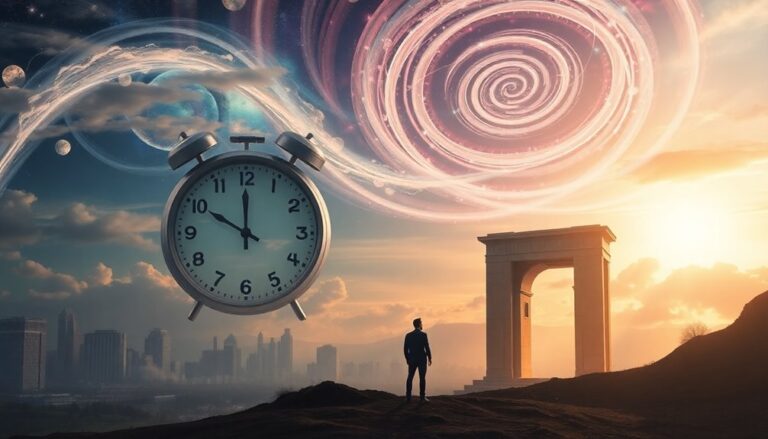Time travel's possibility hinges on theoretical physics concepts like wormholes and time dilation. These ideas suggest that, under certain conditions, you could travel to different points in time. However, paradoxes like the grandfather paradox raise challenges, making time travel less straightforward. While some theories, such as closed timelike curves, offer fascinating solutions, practical implementation remains a significant hurdle. Current research in quantum mechanics fuels excitement and speculation, yet the laws of physics might still set limitations. If you explore further, you'll uncover the latest scientific theories and cultural perspectives surrounding this enthralling topic.
Essential Insights
- Current scientific theories like wormholes and time dilation suggest that time travel could be theoretically possible under specific conditions.
- Paradoxes such as the grandfather paradox raise significant challenges, complicating the feasibility of time travel.
- Research in quantum mechanics and experimental simulations continues to explore time travel concepts, indicating ongoing scientific interest and potential breakthroughs.
- The Chronology Protection Conjecture posits that the laws of physics may inherently prevent time travel, limiting its practical realization.
- Cultural narratives and public fascination reflect a blend of scientific curiosity and speculative fiction, influencing perceptions of time travel possibilities.
Theoretical Concepts of Time Travel
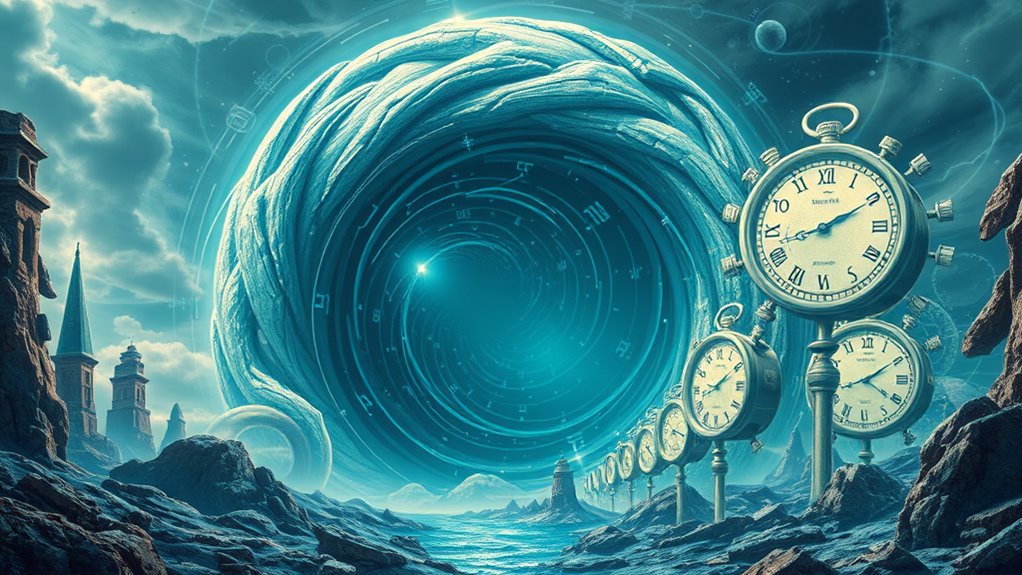
When exploring the theoretical concepts of time travel, you'll encounter fascinating ideas like wormholes, black holes, and the Tipler Cylinder.
Wormholes are imagined as tunnel shortcuts through space, connecting distant regions. If you position one mouth of a wormhole near a significant mass while keeping the other far away, you could generate a closed timelike curve, potentially allowing time travel. To create such a time machine, you'd need to move one end close to the speed of light, leveraging time dilation effects. The Eddington-Finkelstein metric helps trace particles through these hypothetical wormholes, revealing wormhole dynamics further. Interestingly, the concept of wormholes draws from Einstein's theories, which lay the foundation for understanding these fascinating structures.
On the other hand, black hole mechanics introduce their own intriguing possibilities. If two orbiting black holes overlap their event horizons, they might create a pathway for time travel. The extreme curvature of spacetime near these black holes could bend the time axis, allowing an object to experience time in reverse. However, this scenario comes with risks like spaghettification and challenges regarding exiting the black hole.
Lastly, the Tipler Cylinder offers another theoretical approach. By spinning a dense cylinder of matter at incredible speeds, you could create a closed timelike curve. Following a precise spiral path around it might let you travel backward in time.
While these concepts remain deeply theoretical and require advanced technology, they open up exciting discussions about the nature of time and our universe.
Paradoxes of Time Travel
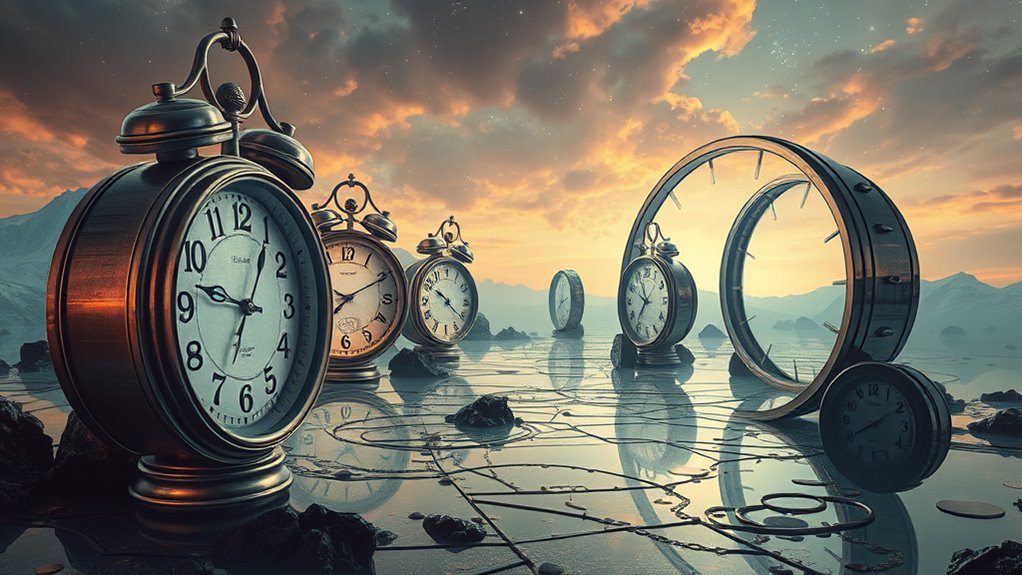
Time travel fascinates many, but it also introduces complex paradoxes that challenge our understanding of causality and existence. Among the most intriguing are the causal loops and consistency paradoxes, which create scenarios where cause and effect become perplexingly intertwined. You might find these paradoxes particularly compelling:
- Predestination Paradox: Your actions as a time traveler become part of history, ensuring that any attempts to alter the past lead back to the original cause.
- Grandfather Paradox: Imagine traveling back and accidentally preventing your grandfather from meeting your grandmother. This inconsistency raises questions about your own existence.
- Bootstrap Paradox: Consider an object sent back in time that has no clear origin, as it exists solely because it was sent by a future version of itself.
These paradoxes underscore the challenges in understanding time travel. Consistency paradoxes, like the Grandfather Paradox, show how altering past events can disrupt the timeline, while the Novikov Self-Consistency Principle suggests that such changes can't occur. This principle posits that events causing inconsistencies have zero probability of happening, highlighting the significance of timeline protection hypotheses in addressing these challenges.
In contrast, causal loops maintain internal consistency, ensuring that events within the loop remain unchanged. They operate under a self-sustaining nature, preventing interference with the overall timeline.
Ultimately, grappling with these paradoxes invites deeper questions about the nature of time, existence, and our understanding of reality itself. As you explore these possibilities, you'll find a rich tapestry of theoretical frameworks begging for further examination.
Historical Perspectives on Time Travel
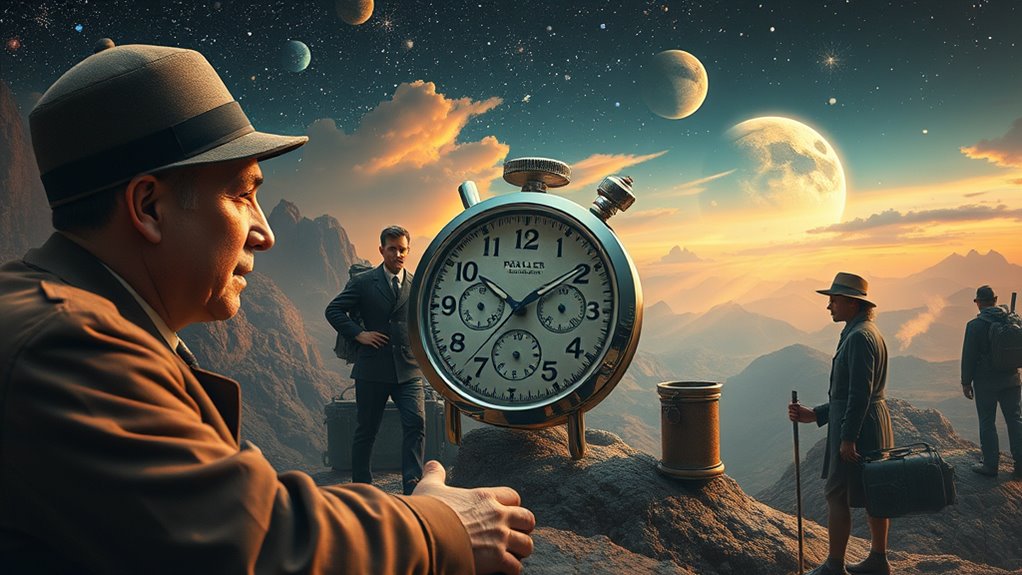
Exploring the complexities of time travel reveals that humanity's fascination with the concept dates back centuries. Ancient stories from various cultures showcase this intrigue. For instance, a Sanskrit poem from around 400 BCE presents an early time travel narrative, while Hindu mythology tells of King Raivata Kakudmi, who visits heaven and returns to find countless ages have passed.
Greek mythology offers a cyclical view of time, suggesting that events repeat infinitely, and the Buddhist Pāli Canon hints at the relativity of time across different domains. The Japanese tale of "Urashima Tarō" illustrates a fisherman who visits an undersea palace, only to return 300 years later.
As time marched on, the literary evolution of time travel took shape in the 19th century. Enrique Gaspar y Rimbau's *El Anacronópete* (1887) stands out as one of the first stories featuring a time machine. Edward Page Mitchell's "The Clock that Went Backward" (1881) introduces a clock that transports people back in time.
H.G. Wells' *The Time Machine* (1895) popularizes mechanical time travel, influencing countless works to follow. Pierre Boitard's "Paris avant les hommes" (1861) also explores prehistoric journeys. Notably, these narratives align with the understanding of Einstein's general relativity, which provides a scientific foundation for the concept of time travel.
These narratives not only entertain but reflect societal concerns and advancements in scientific understanding. Time travel in literature continues to captivate modern audiences, proving that our fascination with this concept remains as strong as ever.
Quantum Mechanics and Time Travel
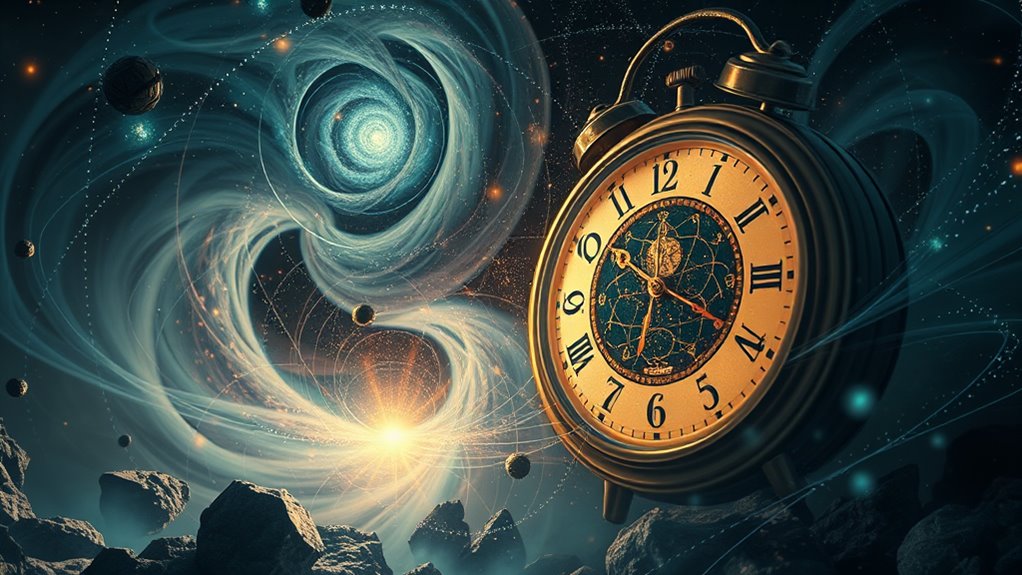
Quantum mechanics presents intriguing possibilities for time travel, particularly through the phenomenon of quantum entanglement. This concept suggests that entangled particles are linked, regardless of the distance separating them, allowing for instantaneous correlations.
You might find it fascinating that researchers are exploring how this entanglement can simulate time travel in various experiments. Here are three key aspects:
- Entangled Particles: These particles can retroactively change outcomes, providing a form of "hindsight" that enhances measurement precision.
- Quantum Time Loops: Closed timelike curves (CTCs) operate at the subatomic level, offering theoretical frameworks for retrocausal effects, where causes and effects can appear reversed.
- Quantum Metrology: By utilizing entanglement, scientists can conduct highly sensitive measurements, solving challenges that standard physics can't address. Additionally, the simulation allows for retroactive adjustments to past actions in experiments, further illustrating the potential of quantum mechanics in exploring time travel.
Through these principles, quantum mechanics offers a unique lens to view time travel. For instance, the theoretical frameworks introduced by David Deutsch and later expanded by Seth Lloyd highlight potential pathways to reconcile quantum mechanics with general relativity.
You might even consider how quantum computing techniques, like post-selection, test these intriguing theories.
As researchers continue to investigate the implications of quantum entanglement and retrocausal effects, the dream of time travel becomes a more tangible possibility.
While practical applications remain in the domain of theoretical exploration, the advancements in quantum mechanics hold the key to understanding the complexities of time itself.
Current Scientific Research

In recent years, researchers have made significant advancements in understanding the theoretical foundations of time travel, building on principles from special and general relativity. You might be interested to know that special relativity indicates time dilation occurs at high velocities, while general relativity introduces concepts like closed timelike curves. Current experiments focus on these theories, exploring solutions such as Gödel spacetime and rotating black holes, which could provide insights into the feasibility of time travel. Interestingly, theoretical solutions for backward time travel exist within the framework of general relativity, adding another layer to the discussion.
Technological advancements are essential in this field. For instance, scientists are investigating wormholes as potential pathways through spacetime. By accelerating one end of a wormhole to near-light speed or positioning it in a strong gravitational field, researchers hope to create time differences that could allow for time travel. However, the stability and navigability of these hypothetical constructs present significant challenges.
Other proposed models, like the Tipler Cylinder and the donut-shaped vacuum theory by Amos Ori, face their own hurdles. These mechanisms, while intriguing, rely on materials and energy levels that we currently lack. As you can see, while the theoretical groundwork is expanding, practical applications remain distant.
Moreover, the issue of temporal paradoxes complicates the discussion further. The Chronology Protection Conjecture by Stephen Hawking suggests that laws of physics might inherently prevent time travel to preserve causality. Ensuring logical consistency in these scenarios continues to be a significant challenge for researchers working to make time travel a reality.
Public Claims and Speculations
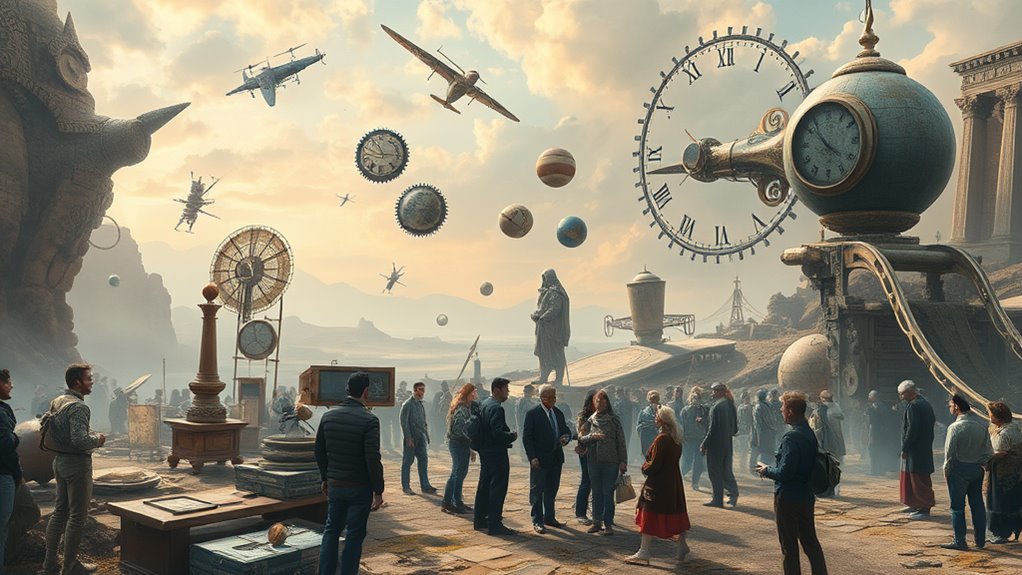
Public claims and speculations about time travel have captured the imagination of many, often blurring the lines between fact and fiction. These stories, whether rooted in alleged government projects or speculative narratives, contribute to a fascinating cultural landscape. You might find it interesting to explore a few prominent examples:
- Project Pegasus: Allegedly a covert U.S. government initiative where individuals like Andrew Basiago claim to have participated as time travelers.
- Montauk Project: Rumored experiments at Camp Hero linked to interdimensional travel, which inspired popular media like "Stranger Things."
- Internet Hoaxes: Various stories, such as the supposed Chinese space-time tunnel, spread rapidly online but are ultimately debunked.
Public perception of time travel remains a mixed bag. While a CBS News poll shows that 39% of Americans believe it could one day be possible, a significant portion of the population remains skeptical. The allure of speculative stories about future technologies, like those from the "Man from 2365," fuels interest, even if many claims lack verifiable evidence. Moreover, the concept of parallel universes suggests that even if time travel were possible, it could lead to entirely new realities rather than altering our own history.
Cultural influence plays a key role here; time travel themes in literature and media not only shape how you perceive time travel but also reflect societal hopes and fears.
While many of these claims sound intriguing, it's crucial to separate fact from fiction and recognize the impact of internet hoaxes on public belief. Ultimately, the fascination with time travel continues to thrive, driven by a blend of speculation, cultural narratives, and human curiosity.
Frequently Asked Questions
What Are the Potential Risks of Time Travel to Individuals?
When you think about the potential risks of time travel to individuals, paradox consequences and temporal displacement come to mind.
You could inadvertently alter key historical events, leading to unforeseen ramifications in your life or the lives of others.
Experiencing different time periods might cause psychological trauma or culture shock, making readjustment difficult.
Furthermore, the stress of maneuvering these changes can result in mental health issues, complicating your overall experience of time travel.
How Would Time Travel Impact Societal Norms and Ethics?
Time travel would deeply impact societal norms and ethics, presenting you with moral dilemmas at every turn.
You'd need to navigate historical responsibility, understanding that your actions could disrupt cultural values and practices. By respecting the beliefs of past societies, you'd minimize interference with history.
It's essential to weigh the consequences of your choices, ensuring they align with ethical considerations to prevent harm and preserve the integrity of those times you visit.
Are There Any Fictional Depictions of Time Travel That Inspire Real Research?
Fictional depictions of time travel often inspire real research by sparking curiosity and imagination.
When you explore stories like H.G. Wells' *The Time Machine*, you see how literary inspiration can lead to discussions about scientific theories like wormholes and time dilation.
Works by authors such as Ted Chiang also encourage interdisciplinary research, pushing boundaries in understanding language and communication within time travel contexts, ultimately bridging the gap between fiction and scientific inquiry.
What Technologies Might Be Developed to Facilitate Time Travel?
Imagine revealing the universe's secrets, where quantum mechanics and wormhole theories become your keys.
You might witness history firsthand or explore distant galaxies. Technologies like quantum sensors could help you tap into past data, while theories about stable wormholes could create shortcuts through time.
If scientists harness high-speed travel, you could experience time dilation, allowing you to journey through the fabric of space-time like never before.
Your adventures await, limited only by imagination!
How Do Different Cultures View the Concept of Time Travel?
Different cultures offer unique interpretations of time travel rooted in historical beliefs.
For instance, Ancient Greeks viewed time linearly, associating it with cosmic cycles, while Hindu philosophy embraced a cyclical existence, emphasizing rebirth.
In contrast, Western perspectives often tie time travel to technological advancements.
These cultural interpretations shape how you perceive the possibility and significance of time travel, reflecting deeper questions about existence and humanity's relationship with time itself.
